How To Make a Beautiful Charcuterie Table For Any Occasion
As a participant in the Amazon Services LLC Associates Program and other affiliate programs, Easy Homemade Life may collect a share of sales or other compensation from the links on this page. This comes at no additional cost to you, and all the prices and availability are accurate at the time of publishing.
A charcuterie table is something I will always recommend to anyone hosting a party. Think of a charcuterie board but bigger, grander, and better for a large crowd. This type of setup not only provides a feast for the eyes but also allows guests to sample a wide variety of snacks and appetizers, making it a perfect centerpiece for any gathering.
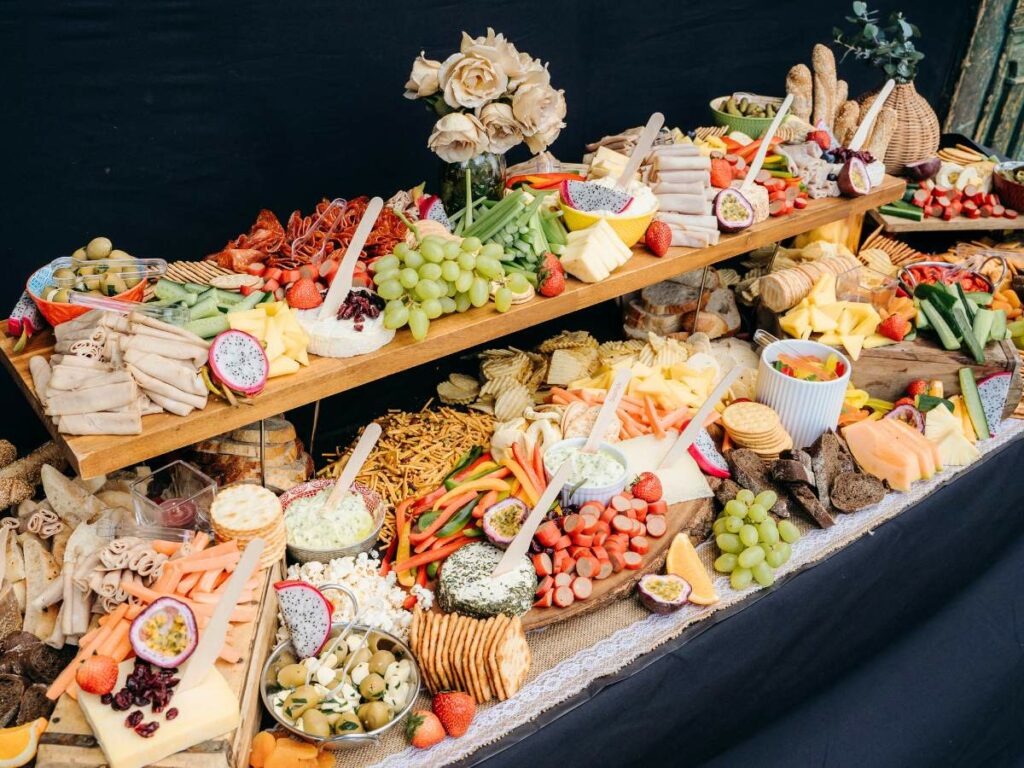
It might seem overwhelming to plan and execute a charcuterie table for the first time, but I’m here to guide you step by step! I’m also happy to walk you through the different charcuterie table styles, the best food to include, plus some quick tips for making a stunning spread.
There are many great ideas to try. I’m sure you’ll find exactly what you need for your special event.
Charcuterie Table Styles
I love hosting parties and helping family and friends plan their gatherings, be it an 18th birthday party, a family reunion, an outdoor wedding, or a simple holiday dinner. In the past, I always struggled with what appetizers to serve because I liked focusing on the main dishes. It wasn’t until I created my first beach-themed charcuterie board for a summer party that I realized how appetizers could steal the show.
Since then, I curated a charcuterie board for many occasions, including Christmas, Easter, and the 4th of July. Eventually, I tried my hand on a charcuterie table, and I had so much fun making it. Like charcuterie boards, charcuterie tables are highly customizable – you can create one depending on your budget and occasion.
They’re also a fantastic option for when you’re aiming for a holiday feast without cooking, allowing you to serve an impressive spread with minimal effort. Choose from the various charcuterie table styles below!
Flat Lay Grazes
A flat lay charcuterie table, where the ingredients are laid down flat directly on the table, is ideal for smaller, simpler parties. It offers guests plenty of surface area to gather around and enjoy the available snacks. This layout uses minimal boards, trays, and décor, so I make sure that I arrange the ingredients thoughtfully to make it aesthetically pleasing.
Pro Tip: For a more organized layout, I like to create sections or clusters based on color or food type. I also like placing contrasting-colored food next to each other for better visual appeal. Not only will your guests find it easy to navigate the spread, but this setup makes for a wonderful flat lay image when photographed!
Grazes With Pedestals
For larger or more elegant gatherings, I usually opt for a charcuterie table with pedestals that perfectly complement the formal dining table setup. I place plates or platters on top of a crate, block, or box to add depth and drama to the spread.
Adding elements such as cake stands, tiered stands, vases, and candelabras also contribute to the overall visual interest of your grazing table. Having height allows you to decorate on top and below, plus it offers accessibility to guests – it allows them to reach and enjoy the food with ease.
Pro Tip: If you’re not comfortable using too many decorative elements in your charcuterie table, you can opt to use the food itself to create height and dimension. I like to pile up sweets, use whole fruits, or arrange breadsticks and crackers upright in jars or glasses.
Themed Charcuterie Tables
One of the best things about charcuterie tables is that you can customize them according to any occasion or party theme. Just like how I curate my themed charcuterie boards, I use colors, elements, and food that align with the theme when putting together the spread.
For example, in a wedding charcuterie board, you can follow the wedding’s color scheme, add elements that showcase the couple’s personalities and interests, and choose seasonal food to add freshness and flavor to the spread. You can highlight summer berries in your spread for a summer wedding or include a selection of pumpkin, pecan, or apple pie for a fall wedding.
Pro Tip: Finishing touches add appeal to your spread. Choose fillers and garnishes that follow the theme of your charcuterie table. I like to use nuts and seeds, herbs, and fresh flowers to complete the look of my spread.
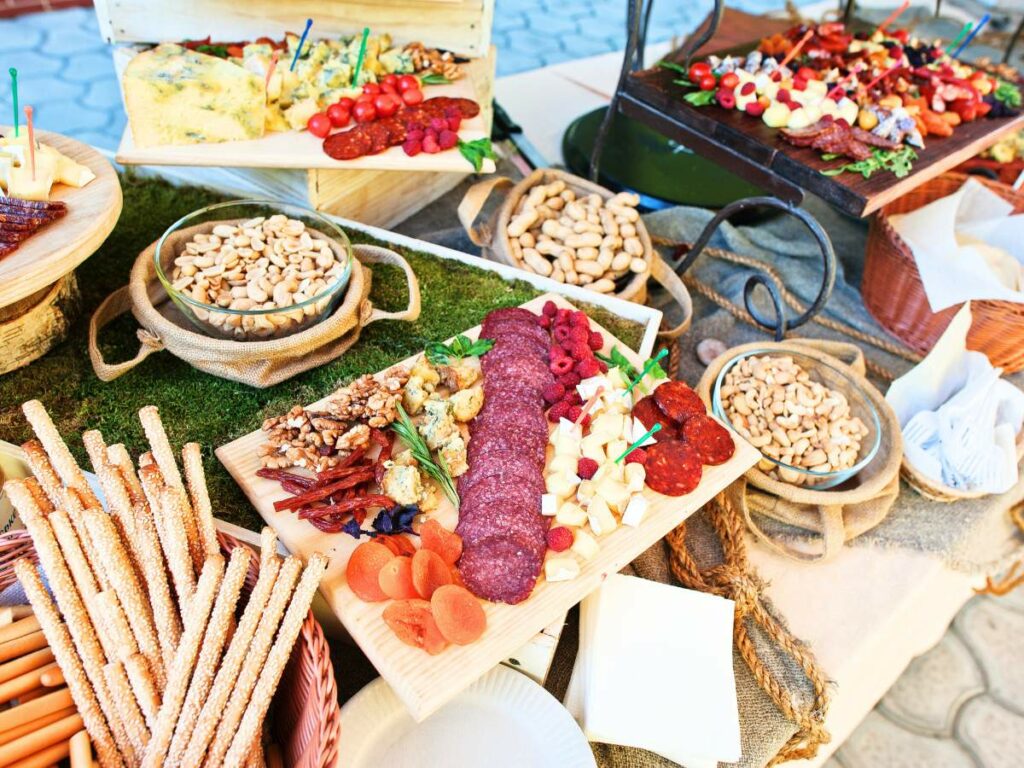
Charcuterie Table Spread: Food To Include
A charcuterie table, also called a grazing table, combines the best of a cheese board and a charcuterie platter. There’s no strict recipe or template to follow when choosing which food to include, but cured meats, cheeses, seasonal fruits and vegetables, bread and crackers, and fillers like nuts and seeds, sweets, and dips are typically used. Let’s go through each category:
Meats
When choosing meats and cold cuts, aim to serve at least two from each category – chicken, beef, pork, and fish and/or seafood so that you can cover the various tastes and preferences of your guests. If you’re going for a vegetarian spread, you can use meat substitutes or plant-based alternatives such as tofu, tempeh, and seitan.
Chicken
- Smoked Chicken or Turkey Breast
- Grilled Chicken Skewers
- Chicken Liver Pâté
- Herbed Chicken Wings
- Smoked Turkey Drumsticks
- Chicken Roulade
- Deviled eggs (not chicken, but makes a great addition to your spread)
Beef
- Roast Beef
- Bresaola
- Beef Jerky
- Beef Salami
- Beef Pâté
- Corned Beef
Pork
- Prosciutto
- Salami
- Pancetta
- Chorizo
- Iberico or Country Ham
- Mortadella
Fish and Seafood
- Smoked Salmon
- Shrimp Cocktail
- Raw Oysters
- Anchovy Fillets
- Ceviche
- Crab Cakes
Cheeses
Cheeses are the crowd favorite, so I make sure my charcuterie table has a variety of cheeses in various shapes, sizes, and textures. I usually serve at least two of each kind – hard, firm, semi-soft, soft, crumbly, and blue cheese. If the crowd is smaller, I stick to just hard, firm, and soft cheese.
- Hard cheeses like parmesan, Parmigiano-Reggiano, Pecorino-Romano, and Asiago
- Firm cheeses like cheddar, gouda, manchego, gruyere, comte, and colby
- Semi-soft cheeses like Havarti, Roquefort, muenster, and fontina
- Soft cheeses like brie, burrata, goat cheese, ricotta, mascarpone, and stracchino
- Crumbly cheeses like goat cheese and feta
- Blue cheeses like gorgonzola, dunbarton blue, and marbled blue jack
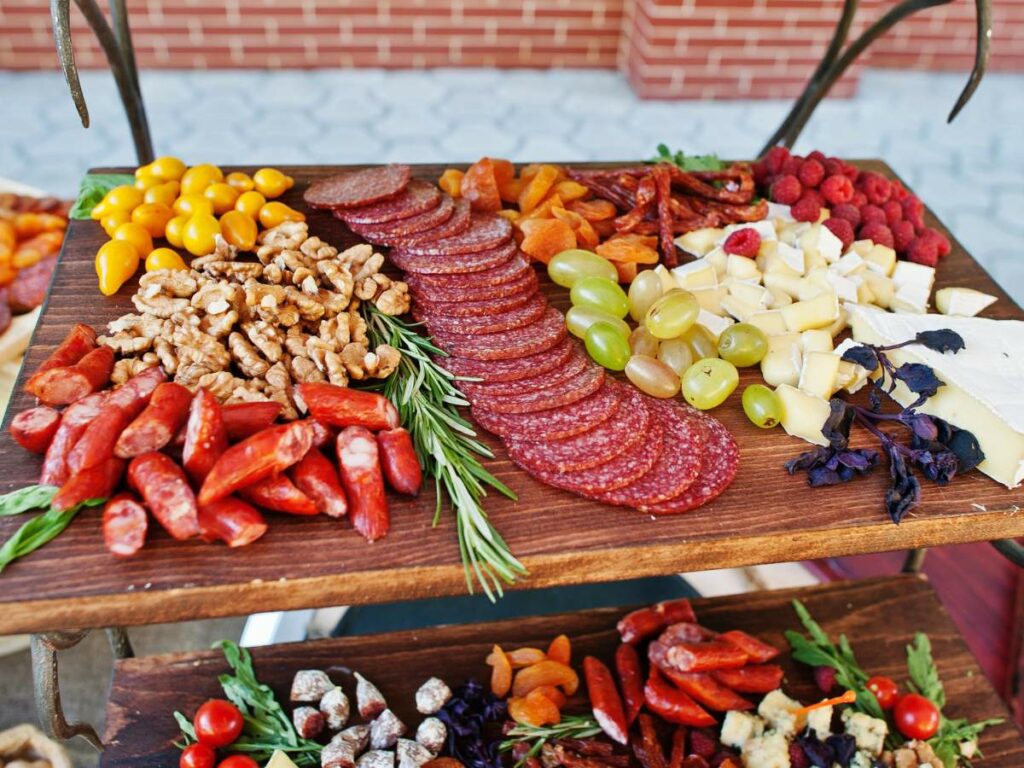
Seasonal Fruits and Vegetables
Fruits and vegetables add freshness and a pops of color to your spread. Each season provides a unique selection that can enhance the aesthetic and flavor profile of your charcuterie table. It’s important to learn how to buy and store fruits and vegetables properly for maximum freshness. Here are some fruit and vegetable suggestions for your charcuterie table:
Winter
- Persimmons
- Pomegranates
- Apricots
- Figs
- Cranberries
- Beets
- Winter Squash
- Brussels Sprouts
- Root vegetables like carrots, parsnips, and radishes
Spring
- Grapes
- Nectarines
- Cherries
- Kiwi
- Asparagus
- Radishes
- Spring onions or scallions
- Artichoke hearts
Summer
- Berries (strawberries, blueberries, blackberries, and raspberries)
- Tropical fruits (mangoes, pineapples, coconut, papaya etc.)
- Citrus fruits (oranges, lemons, limes, grapefruits, etc.)
- Peaches
- Cucumbers
- Cherry Tomatoes
- Green Beans
- Bell Peppers
Fall
- Apples
- Pears
- Melons
- Plums
- Butternut Squash
- Sweet Potatoes
- Broccoli
- Cauliflower
Bread and Crackers
Bread and crackers are also an important part of a charcuterie board – their versatility, neutral taste, and varied textures complement the flavors of the meats, cheeses, and other edible elements in your spread.
I always put 3 to 5 types of bread and crackers in different sizes, shapes, and textures for a well-rounded charcuterie table. Ready to eat options like bruschetta al pomodoro are ideal – no need to dip or pair with other ingredients. Here are some of the best breads for charcuterie, plus some cracker options:
Bread
- Artisanal
- Baguette
- Sourdough
- Ciabatta
- Focaccia
- Multigrain or Whole Grain Bread
- Croissants
- Pita and Flatbreads
- Bread Sticks
Crackers
- Water Crackers
- Multigrain Crackers
- Whole Wheat Crackers
- Artisanal or Seeded Crackers
- Rice Crackers
- Pretzel Crisps or Sticks
- Cheese Crisps
- Pita Chips
Extras
Last but not least are the fillers. Fillers like nuts and seeds, dips and spreads, jams, and sweet treats add diversity to your charcuterie table with their wide variety of flavor and texture. They’re great for filling empty spaces in your spread, too!
Nuts and Seeds
- Almonds
- Walnuts
- Cashews
- Pecans
- Pistachios
- Pumpkin Seeds
- Sesame Seeds
- Sunflower Seeds
Dips and Spreads
- Honey
- Hummus
- Guacamole
- Fruit Preserves
- Pesto
- Jams and Jellies
- Pate
- Tapenades
Sweets
Sweets on a charcuterie table serve as a palate cleanser between bites of savory meats and cheeses. They also add a touch of indulgence and elegance to the spread and at the same time provide a refreshing contrast to the other items in your spread.
The options here are endless, you can go as simple as cookies, chocolates, and wafers or as indulgent as pastries, pies, and mini cakes. I like matcha brownies because they are easy to present, and already cut into single portions.
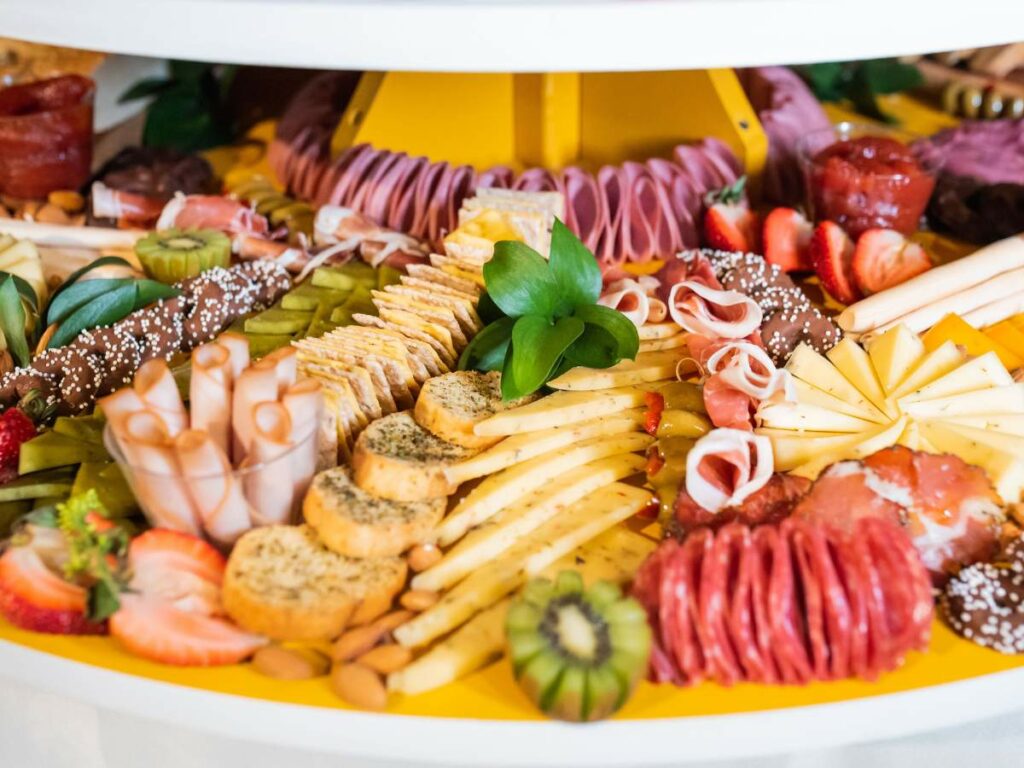
How To Make A Charcuterie Table
Putting together a grazing table is just like putting together a traditional charcuterie board, just on a bigger scale and with added dimensions of presentation. It’s best if you gather your equipment and food supplies in one place for efficiency.
Here are the non-food items that you’ll need:
- A long table or a countertop
- Butcher or craft paper
- Small bowls and containers (for dips, spreads, and small food items)
- Serving spoons
- Mini forks
- Spoons and spreaders
- Cheese knives (sharper knives for firm cheeses and spreader knives for soft cheeses)
- Tongs
- Bamboo toothpicks
- Disposable mini plates
- Napkins
- Optional: Trays, labels, cake stands, tiered stands, candelabras, and other decorative elements
Step 1: Prepare Your Table
Give your table or countertop a good wipe before anything else. I always make sure that I clean my quartz countertop thoroughly before I put any food on it.
Next, roll out butcher or craft paper and cover the surface for easy cleanup later. This creates a protective base for arranging your food items and a hygienic serving area for your guests.
Step 2: Bring Out The Large Items
Place large food items like whole fruits, cheese wheels, baguettes, and rolls on the table first. Position them strategically to create structure and anchor different sections of your display. If you’re going to use large decorative items like crates, cake stands, and candelabras, now is the perfect time to add them to the layout.
Step 3: Add The Main Food Items
Divide the table into quadrants and place 1 to 2 meats in each, followed by 1 to 2 cheeses, fruits and veggies, and breads and crackers they best pair with. Be creative with your food presentation – think salami roses, cheese towers, and fruit arrangements. Make sure that they are all accessible and easy to grab, so avoid laying them flat on the table as much as possible.
Step 4: Position Your Charcuterie Supplies
Place bowls and containers on the spread before it gets too crowded. Make sure to position dips and spreads beside foods they best pair with. If you’re serving jams, you can serve them in mini jars or small bowls.
If you’re not sure what flavors to serve, you can start with blueberry, strawberry, or apricot – they’re among the best jams for a charcuterie board since they’re familiar to the taste and they add vibrance to your spread. Now is also the perfect time to place other charcuterie supplies on the table, including your labels, serving spoons, tongs, cheese knives, etc.
Step 5: Add The Fillers and Garnishes
The next step is adding the fillers – fill empty spaces of the spread with your nuts and seeds and sweet treats. You can place fillers wherever you see fit, but be mindful about creating a balanced spread with a variety of colors, flavors, and textures. To finish the look, add some herbs, fresh flowers, or any décor of your choice.
Wrapping Up
Putting together a stunning charcuterie table isn’t as difficult as it seems. Take inspiration from small charcuterie board ideas and grazing table arrangements you see online until you can decorate an entire spread on your own. Experiment with different combinations of meats, cheeses, fruits, vegetables, and decorative elements to find your own unique style and create an impressive spread for any occasion.
If you like what you read, share this article with family and friends. You can also bookmark it and come back when you’re ready to make your first charcuterie table!
How To Make A Stunning Charcuterie Table
Equipment
- 1 Long table or a countertop
- 1 Butcher or craft paper
- Small bowls and containers for dips, spreads, and small food items
- Serving spoons
- Mini Forks
- Spoons and spreaders
- Knives sharper knives for firm cheeses and spreader knives for soft cheeses
- Tongs
- Bamboo Toothpicks
- Disposable mini plates
- Napkins
Materials
Cheeses
- Hard cheeses parmesan, Parmigiano-Reggiano, Pecorino-Romano, and Asiago
- Firm cheeses cheddar, gouda, Manchego, gruyere, comte, and colby
- Semi-soft cheeses Havarti, Roquefort, muenster, and fontina
- Soft cheeses brie, burrata, goat cheese, ricotta, mascarpone, and stracchino
- Crumbly cheeses goat cheese and feta
- Blue cheeses gorgonzola, dunbarton blue, and marbled blue jack
Seasonal Fruits and Vegetables
- Winter produce persimmons, pomegranates, apricots, figs, cranberries, beets, winter squash, brussels sprouts, and root vegetables
- Spring produce grapes, nectarines, cherries, kiwi, asparagus, radishes, spring onions, and artichoke hearts
- Summer produce berries, tropical fruits, citrus fruits, peaches, cucumbers, cherry tomatoes, green beans, and bell peppers
- Fall produce apples, pears, melons, plums, butternut squash, sweet potatoes, broccoli, and cauliflower
Breads and Crackers
- Bread baguette, sourdough, ciabatta, focaccia, whole grain bread, croissant, pita, flatbreads, and breadsticks
- Crackers multigrain, whole wheat, artisanal, seeded, and rice crackers, pretzel crisps or sticks, cheese crisps, and pita chips
Extras
- Nuts and seeds almonds, walnuts, cashews, pecans, pistachios and pumpkin, sesame, and sunflower seeds
- Dips and spreads honey, hummus, guacamole, fruit preserves, jams and jellies, pesto, pate, and tapenades
- Sweet treats cookies, chocolates, wafers, pastries, pies, and mini cakes etc.
Instructions
- Wipe your table or countertop clean and cover the surface with butcher or craft paper for easy cleanup later.
- Arrange large food items like whole fruits, cheese wheels, baguettes, and rolls on the table, followed by large decorative items like crates, cake stands, and candelabras.
- Divide the table into quadrants and place 1 to 2 meats in each, followed by 1 to 2 cheeses, fruits and veggies, and breads and crackers they best pair with.
- Next, add your charcuterie supplies like bowls and containers, labels, serving spoons, tongs, cheese knives, etc.
- Fill empty spaces with your fillers like nuts and seeds and sweet treats. Finish the look of your spread with herbs, fresh flowers, or any décor of your choice.


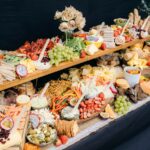
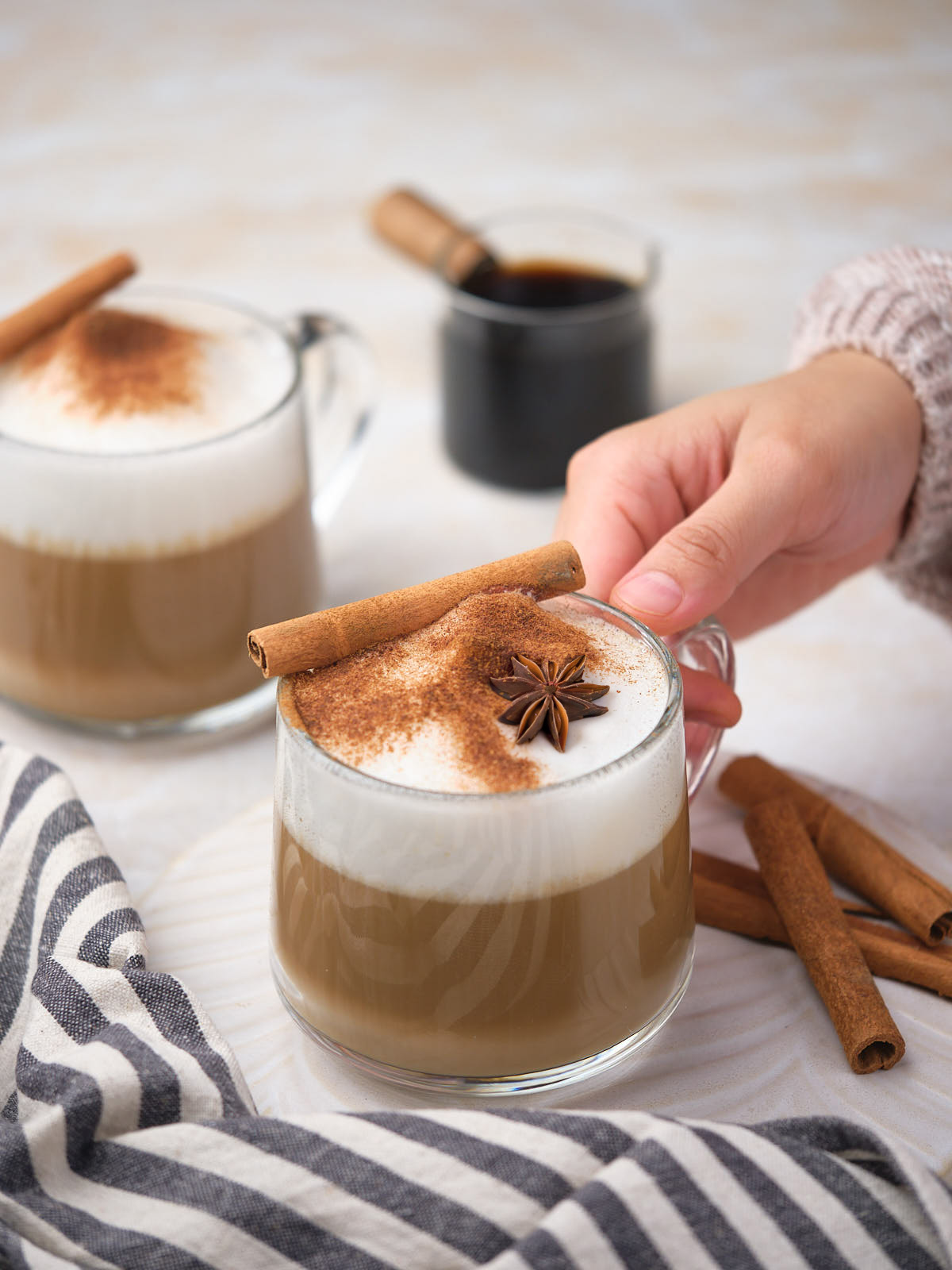
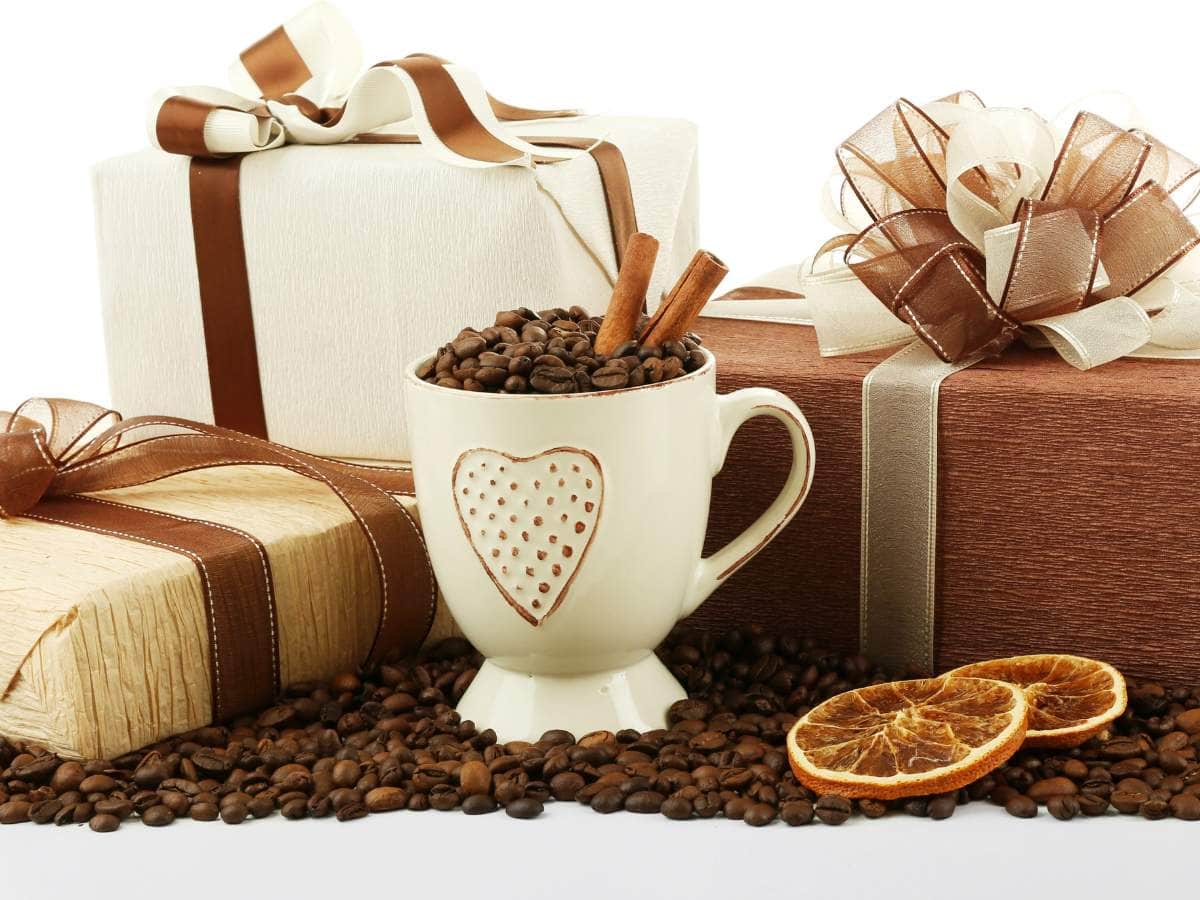
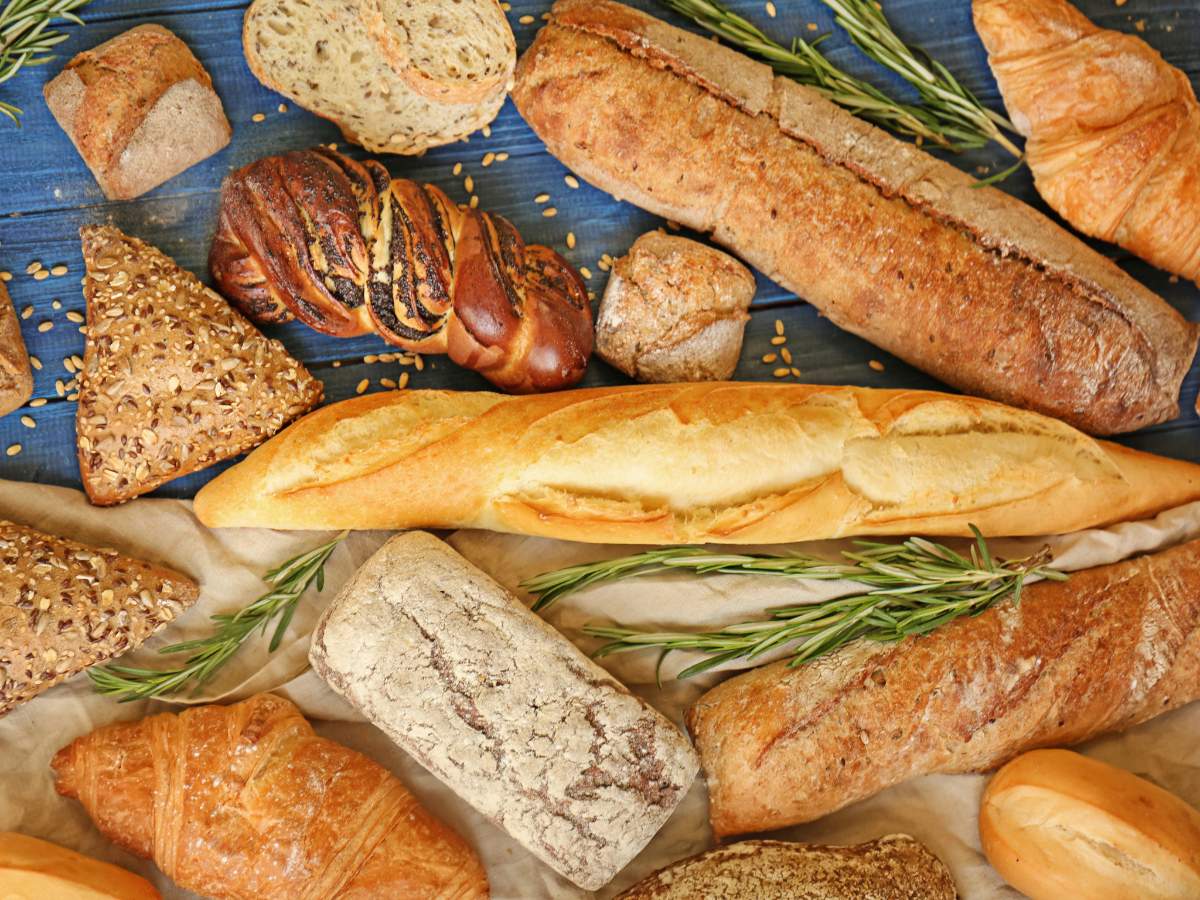
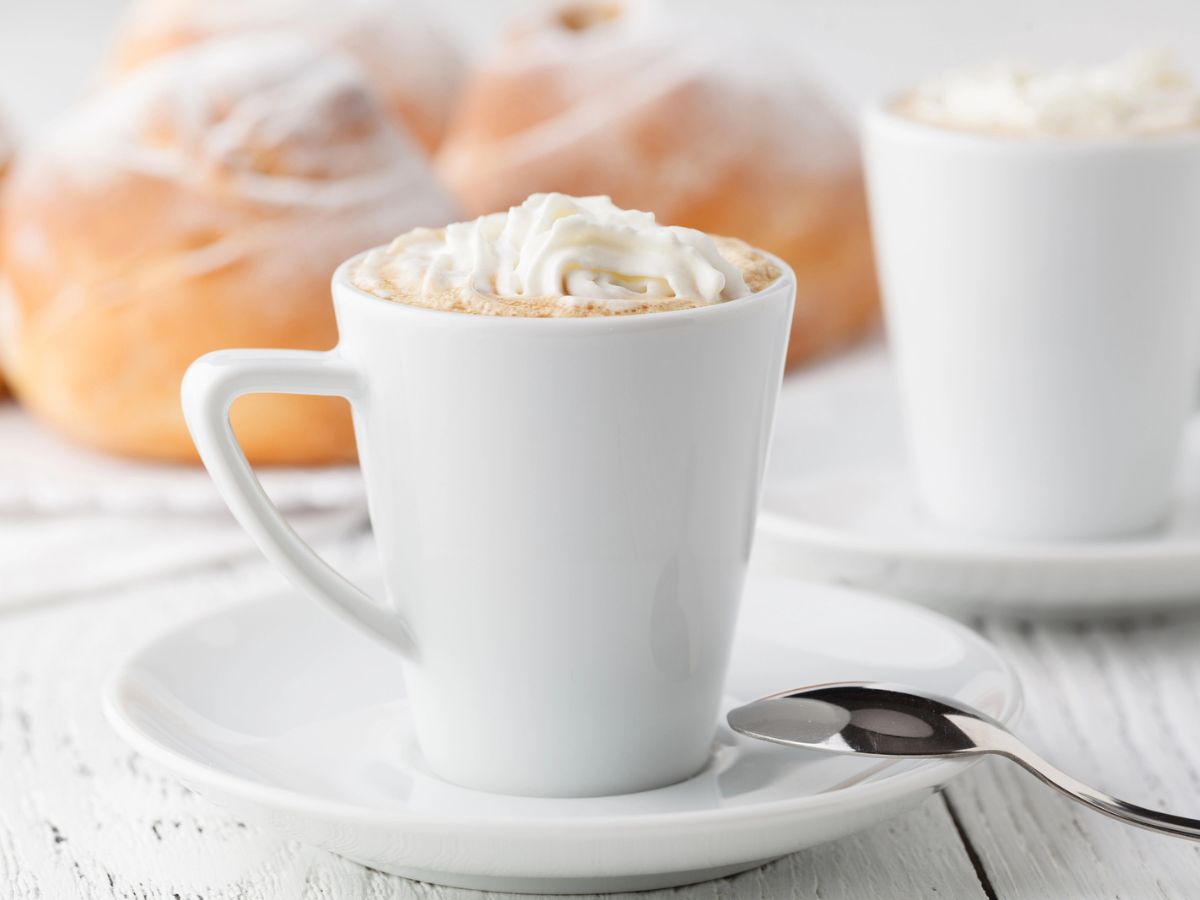

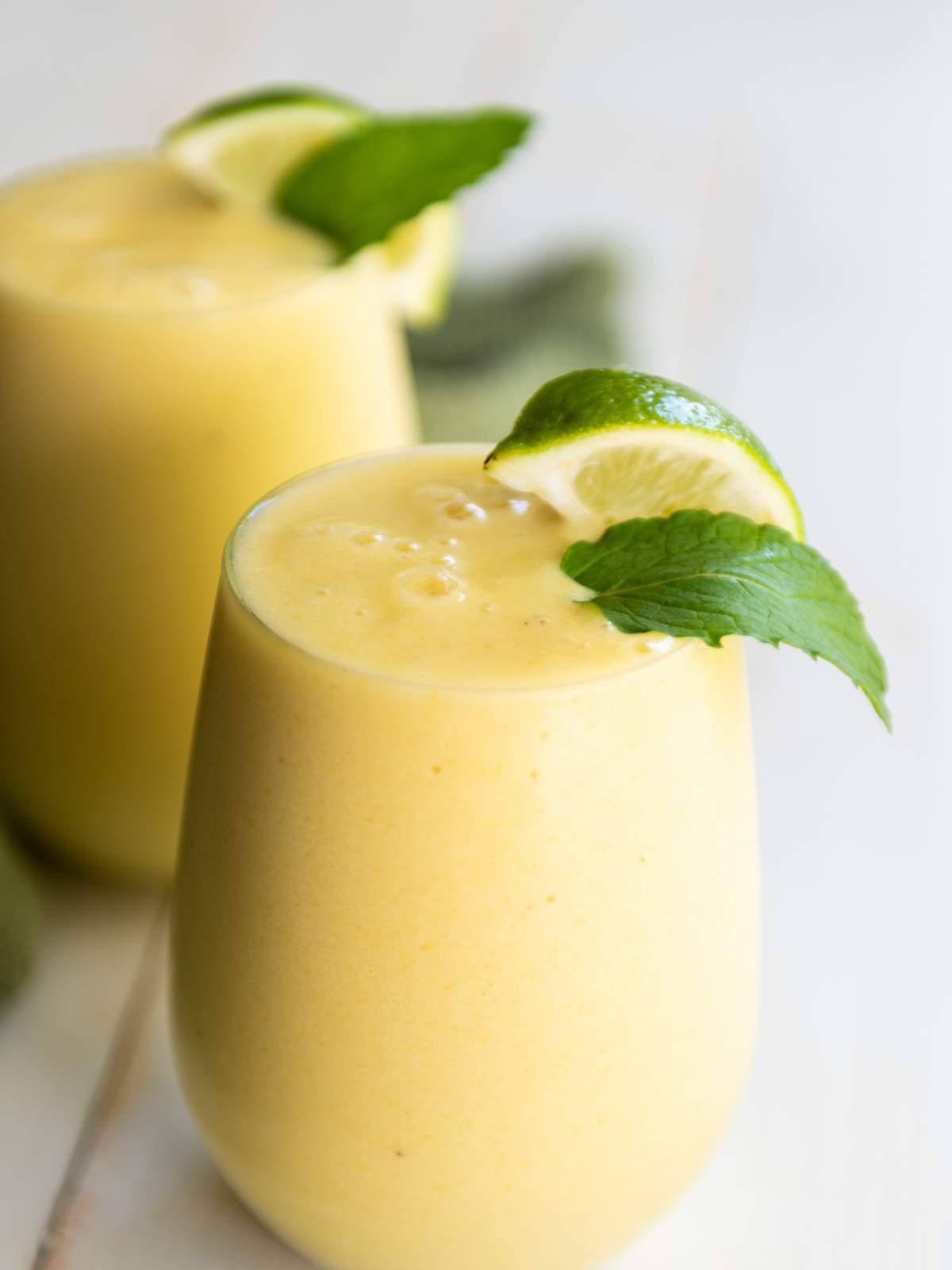
This is just what I needed for my family reunion next month! Thanks!
I hope the family reunion goes amazing, Zebby. Good luck!
I’m planning for a summer party and these ideas are perfect, especially as it relates to height. I like the idea of using cake plates. Plus all the ideas for what to include, I’m much farther along in my planning. lol Thank you so much for the all the tips.
I’m glad you like them, Marjory. I hope your summer party goes well!